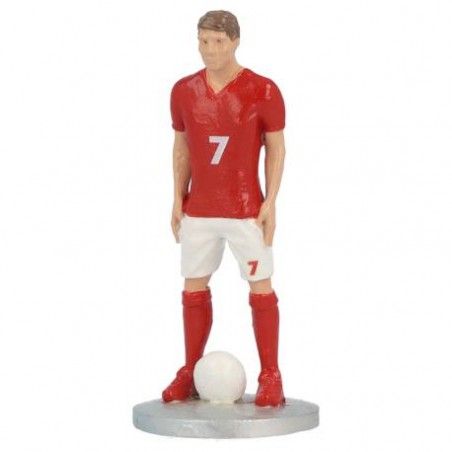




Miniature football player with kit of the national team of Switzerland.
Our football players are casted in metal, and afterwards painted with care and sense for detail. Also discover our other football players.

Pay safely

Fast delivery

Return & Refund
The Swiss football team is a team of footballers that represents Switzerland in international matches and competitions. It is nicknamed (Schweizer) Nati, short for Schweizer Nationalmannschaft. The home kit of Switzerland is red, referring to the flag of the Alpine country.
On Sunday 12 February 1905, Switzerland played the very first official international match in history. In the Parc des Princes in Paris, the team led by Victor Schneider lost 1-0 to France by a goal from Gaston Cyprès in the 60th minute. The friendly game was officiated by English referee John Lewis.
Switzerland did not participate in the first World Cup 1930, but did attend in 1934 in Italy. They managed to qualify in a group with Yugoslavia and Romania. They made it to the quarter-finals by first beating the Netherlands, but then lost to the Czechoslovakian football team. Four years later, they participated again and again reached the quarterfinals, this time losing to Hungary. They defeated Nazi Germany in the first round 4-2 despite a 1-1 draw. In the 4-2 victory, Ernst Lörtscher scored the first own goal in a world championship. The following round, they lost 0-2 to Hungary.
In 1950, they were back in action but only finished third in the group stage. They won against Mexico, drew against Brazil and lost against Yugoslavia. In 1954, the World Championships were played in Switzerland, where they played in group D and were able to qualify for the next round. They won 2-1 against Italy, then lost 2-0 against England. In the play-off game, they won against Italy, although they were in the group with Belgium, they were not played against them. In the eighth final they played against Austria, losing 7-5.
The team failed to qualify for the 1958 World Cup, but four years later they were back in action. At the 1962 World Cup, they were unable to win a single match and finished last in a group with West Germany, Chile and Italy. The same result in 1966, they did not get past the group stage with West Germany, Spain and Argentina.
For almost a quarter of a century, Switzerland did not host any international tournament for the national team, when in the autumn of 1993, the highly acclaimed English national coach Roy Hodgson managed to secure qualification for the 1994 World Cup in the United States with his squad. At the final round, the rather open Swiss showed an unpredictable side. The team started in Detroit with a draw (1-1) against the host country, then achieved a sensational 4-1 victory over the much stronger Romania, only to return home after the eighth finals with disappointing defeats against Colombia (0-2) and Spain (0-3).
Switzerland also showed its capricious side in the qualification series for the 1996 European Football Championship in England. The Swiss won the away match against Turkey, which was considered difficult, but just as easily lost the home game against the same opponent. On several occasions, the 4-4-2 team showed resilience. In the opening game against Sweden, they were twice seen to be behind, but still won 4-2. In Budapest, things looked very bad when the Hungarians took a 2-0 lead in the final stages. Switzerland's footballer of the year Néstor Subiat then single-handedly saved the day by scoring twice in quick succession.
Hodgson was seen as the founder of the Swiss national team's success in the mid-1990s. As successor to Uli Stielike, he commanded respect for the optimal atmosphere he created and for the good results he achieved. At the end of 1995, he opted for a lucrative contract with Internazionale. Hodgson wanted to continue guiding Switzerland on a part-time basis until the European Championships in England, but the Swiss association was not willing to do so. His successor was the Portuguese Artur Jorge, who was not very successful in his first few matches. Under his leadership, Switzerland failed in the first round in a group that also consisted of host England, Scotland and the Netherlands. After the tournament, Jorge was thanked for his services and was replaced by Rolf Fringer.
At the 2010 World Cup, especially during the Chile-Switzerland match on 21 June, Switzerland broke the record for the number of consecutive minutes without a goal in a World Cup finals tournament. At the time of the goal in the 75th minute, the Swiss goal had remained clean for 558 minutes. In 2006, the team did not score a single goal in any of its three group matches, and even in the eighth final it remained 0-0, but the Swiss were eliminated by Ukraine after penalty kicks. Also at this World Cup, the first group game against Spain was won: 1-0. Switzerland's previous goal was Aitor Beguiristain's penalty kick in the eighth final of the 1994 World Cup against Spain (in the 86th minute). The previous record was held by Italy with 550 minutes.
In 2021, history was made at the European Championships. It finished as number three in Group A with Italy, Turkey and Wales with four points. It was one of the best three teams and was therefore allowed to play in the eighth finals against France. Switzerland turned around a 3-1 deficit and managed to secure an extension in the final minute. The subsequent penalty shootout was won by the Schweizer Nati. Yann Sommer saved the French side's fifth penalty from Kylian Mbappé. For the first time since 1954, the Swiss again reached the quarterfinals of a final tournament. This quarter-final was eventually lost - also after penalty kicks - to Spain.
Data sheet